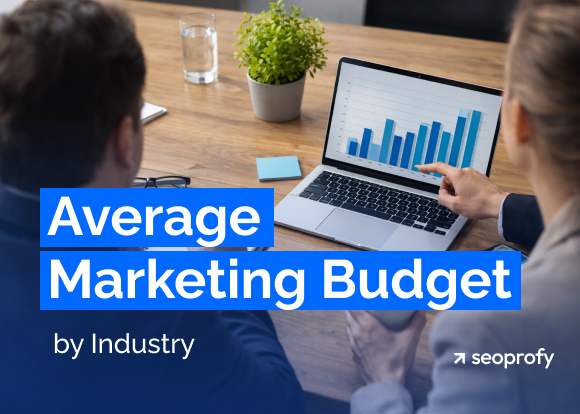Success in the legal profession heavily relies on maintaining a stellar reputation. Lead generation for lawyers is the first step in forging the attorney-client relationship.
The legal industry tends to have lengthy buying cycles. The decision to hire a lawyer carries a lot of weight — it can profoundly impact people’s lives or businesses. Clients put immense trust in you to handle critical matters like drafting a will, filing for divorce, or defending them in court. It’s also a significant financial commitment for them.
When it comes to specialized law practice areas, generating qualified leads can be even more challenging. But with smart lead generation for attorneys, you can focus your energy on the most promising prospects and convince them you’re the one to choose.
- Lead generation is a key proactive approach to attracting potential clients.
- SEO ensures your website shows up at the top of search results when people look for lawyers.
- Content marketing allows you to connect with potential clients with different intent, whether commercial or informational.
- PPC can quickly put your law firm in front of high-intent searchers looking to hire an attorney.
- Social media marketing lets you connect with potential customers on a personal level.
- Traditional advertising through TV and print media is still effective.
What Is Lead Generation for Lawyers?
Lead generation for lawyers is the process of attracting potential clients who may be interested in your services. It enables you to build awareness about your law practice and reach prospective clients at different stages of the sales funnel.
The core value of the sales funnel is that it filters out irrelevant prospects while identifying quality leads for attorneys. Each stage, from the initial contact to the actual legal representation, builds more trust and loyalty. Lawyer lead generation is a structured approach aimed at maximizing your marketing ROI.
Lead generation for attorneys can be done both online and offline. Online client acquisition and lead conversion require a website that ranks highly, which is where law firm SEO services come into play.
Helpful content — like blog posts, videos, and webinars — lets you showcase your legal expertise. Targeted advertising campaigns on Google, Facebook, or Instagram can also put your firm in front of your desired audience.
Even though the lead generation process happens online most of the time, physical interaction remains an important aspect. Community events allow you to connect with potential clients face-to-face. Something as simple as asking your current clients to refer their friends and family members can also help bring in many new law firm leads.
So, the best lead generation strategy for law services combines online and offline tactics. The main goal is to ensure your law firm’s name is the first one people think of when they need legal assistance in the areas you specialize in.
How to Generate Leads for Law Firms
In this guide, we’ll walk through the strategies and provide tips that will help you land quality leads and keep your law firm growing. The following are essentials for lead generation for lawyers:
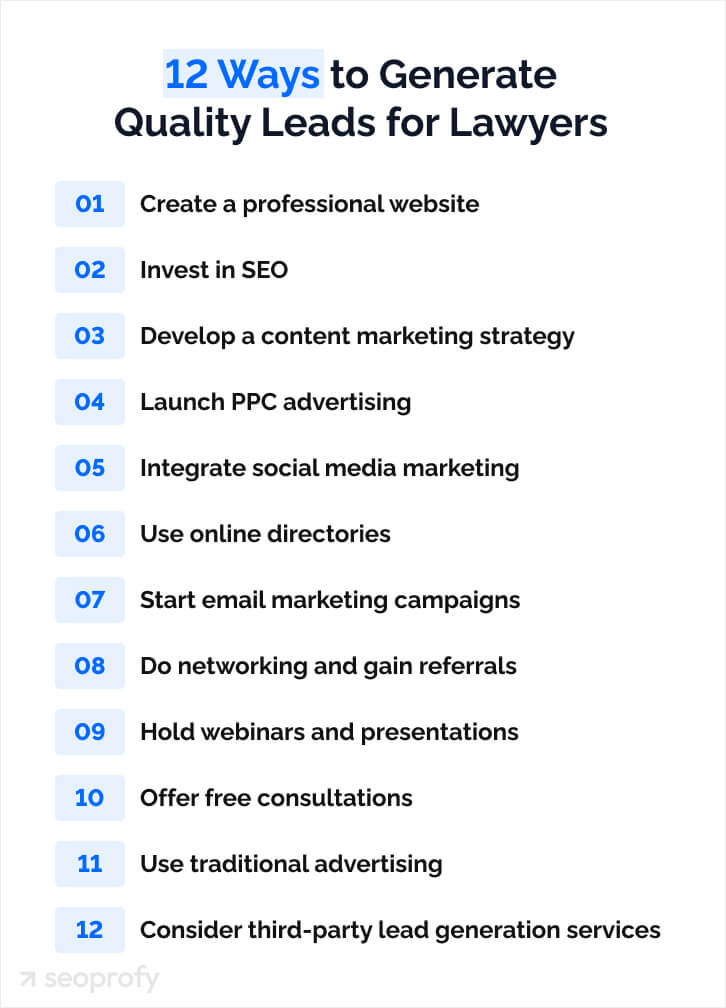
- Create a professional website
- Invest in SEO
- Develop a content marketing strategy
- Launch PPC advertising
- Integrate social media marketing
- Use online directories
- Start email marketing campaigns
- Do networking and gain referrals
- Hold webinars and presentations
- Offer free consultations
- Use traditional advertising
- Consider third-party lead generation services.
Let’s take a closer look at what is needed to attract legal leads for attorneys.
Create a Professional Website
First and foremost, your website is a virtual front door to your practice. It is often the source of potential clients’ first impressions, so it needs to be professional, informative, and optimized to capture leads. At the heart of lead generation for law firms should be high-quality landing pages designed to convert visitors into clients.
A landing page is a web page created for a specific marketing campaign or service. Its sole purpose is to encourage people to take a desired action — in this case, reach out to you. Good landing pages adhere to a few principles:
- The headline should be clear and compelling, instantly showing the main solution you offer.
- The copy should be persuasive, directly addressing your prospects’ pain points. Yet, it’s preferable to avoid legal jargon and clickbait titles that may confuse or mislead visitors.
- The design of the page should carefully guide the visitor toward the desired action from the moment they land there. There shouldn’t be any distractions.
- The page should feature a visually prominent CTA button that compels visitors to take the next step.
It’s common practice for law firms to create dedicated landing pages for each service. This allows you to tailor messaging, visuals, and lead capture forms to specific audience segments.
For example, if you offer personal injury representation, you could create a “Car Accident Lawyer” landing page. Its headline, body copy, imagery, and lead capture form would all center around car accident cases. Personalization can dramatically increase conversion rates compared to generic “Contact Us” pages.
In our opinion, the Morgan & Morgan injury law firm has some of the best landing pages in the industry. The simple layout of the website is easy to understand and use. The website has dedicated sections that break down each specific law practice area in more detail with clear descriptions.
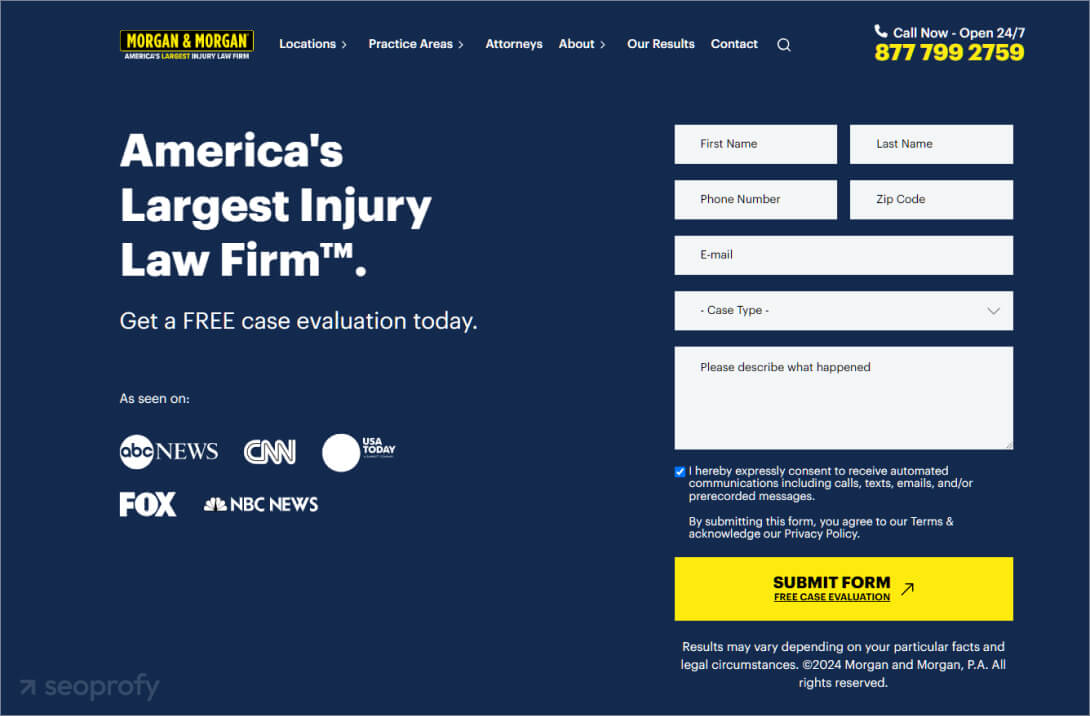
Invest in Search Engine Optimization
Even if your law firm’s website is excellent, it’s unlikely that potential clients will find it through organic search if it’s not optimized for search engines. Effective SEO ensures your website appears prominently in organic search results when your ideal prospects look for the solutions you provide. This way, your site can generate free, targeted organic traffic.
Local SEO is essential for legal practices that serve a local clientele. This approach includes:
- Claiming and optimizing your Google Business Profile with accurate data like your firm’s name, address, phone number, business hours, services, and more
- Listing your business on well-known online directories
- Acquiring backlinks from authoritative local organizations, press, legal resource websites, and more
- Encouraging clients to submit Google Business Profile reviews
- Creating pages and content specific to your business locations.
Let’s take a look at how local SEO works in practice. The top three websites for the keyword “personal injury lawyer San Antonio” receive a sizable amount of monthly organic traffic (3,684, 3,588, and 1,500 visits, respectively).
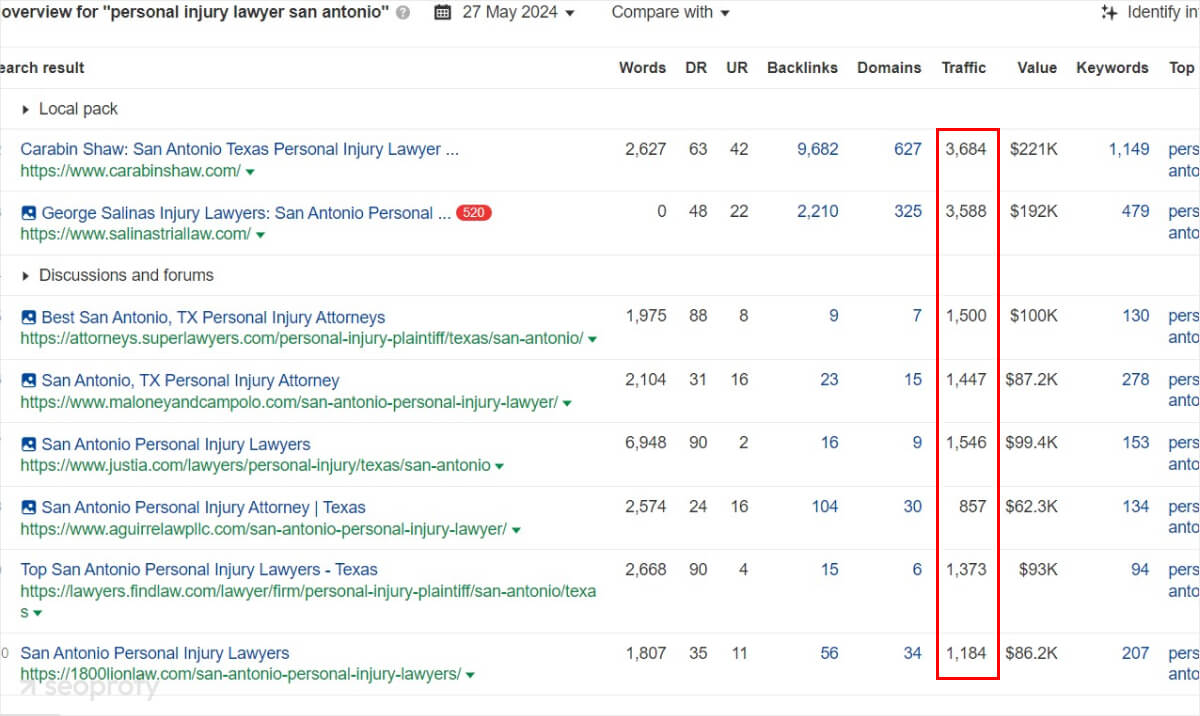
These numbers show how powerful SEO can be for getting new lawyer leads. Of course, this doesn’t mean that these sites get thousands of new clients monthly. However, comprehensive SEO strategies also include content optimization that helps motivate more of those visitors to become clients.
If you look at the “Backlinks” column, the top three search engine results have many linking domains. A large volume of high-quality backlinks from authoritative, relevant websites is one of the most important ranking factors, as it demonstrates authority and trustworthiness to search engines.
The actual design and “under-the-hood” setup of your law firm’s website matters too. This is what technical SEO addresses. Search engines like Google want to see if your website is easy to use, loads quickly, and provides a great user experience across different devices. Even if you have keyword-optimized content and multiple backlinks, poor technical SEO can hold you back.
So, an SEO campaign brings qualified leads for lawyers only when it considers all the aspects, both on-page and off-page. Only then can you compete with the top pages, whether you’re in San Antonio or anywhere else in the world. You can find more details about what makes a successful legal SEO strategy in this lawyer SEO guide.
Don’t want to miss out on potential clients searching for your services online? Our SEO services are tailored specifically for the legal industry to bring the best results for your business.
- Achieve higher rankings for localized, service-specific keywords
- Drive targeted organic traffic from prospective clients in need
- Build authority and trust through strategic content and backlinks
- Fix technical issues for a seamless indexation and user experience.

Develop a Content Marketing Strategy
Content is where you actually put the keywords people are searching for so Google can match their queries with your pages. And once potential clients find you, your content will be a valuable source of information.
The beauty of writing informative blog posts is that your keyword-optimized content can address different user intents. Some people may just be interested in learning about a particular legal issue, not even sure yet if they need a lawyer. You can answer their questions in your articles.
Even if they don’t need legal services right away, you’ll build brand awareness and trust. Then, when the need does arise, your prospective clients will already view you as the go-to expert to hire.
Some of your content can target keywords with commercial intent — for example, phrases like “estate planning lawyer cost.” This content will cater to prospects who have already decided to take legal action and are evaluating their options.

In fact, 46% of attorneys surveyed in this study used content to stay in touch with both unconverted leads and existing clients. Here are the main content types to consider:
- Long-form articles
- FAQs
- Whitepapers
- Webinars and podcasts
- Infographics
- Guest posts
- Profiles on legal directories
- Social media posts
- Instagram, TikTok, and YouTube videos.
When generating leads for lawyers, it’s also possible to reuse content for different purposes, such as email marketing, guest posting, paid advertisements, and more.
Launch PPC Advertising
Pay-per-click (PPC) advertising is targeted online advertising where you, the advertiser, pay a fee every time someone clicks on your ads. The most common forms of PPC are the ads you see above organic search results and social media ads.
With PPC advertising for lawyers, you choose specific keywords or phrases related to the legal services you want to promote. For example, if you want to attract privacy law firm leads, you can target keywords like “privacy law firm” so that your ads show when people search for such phrases.
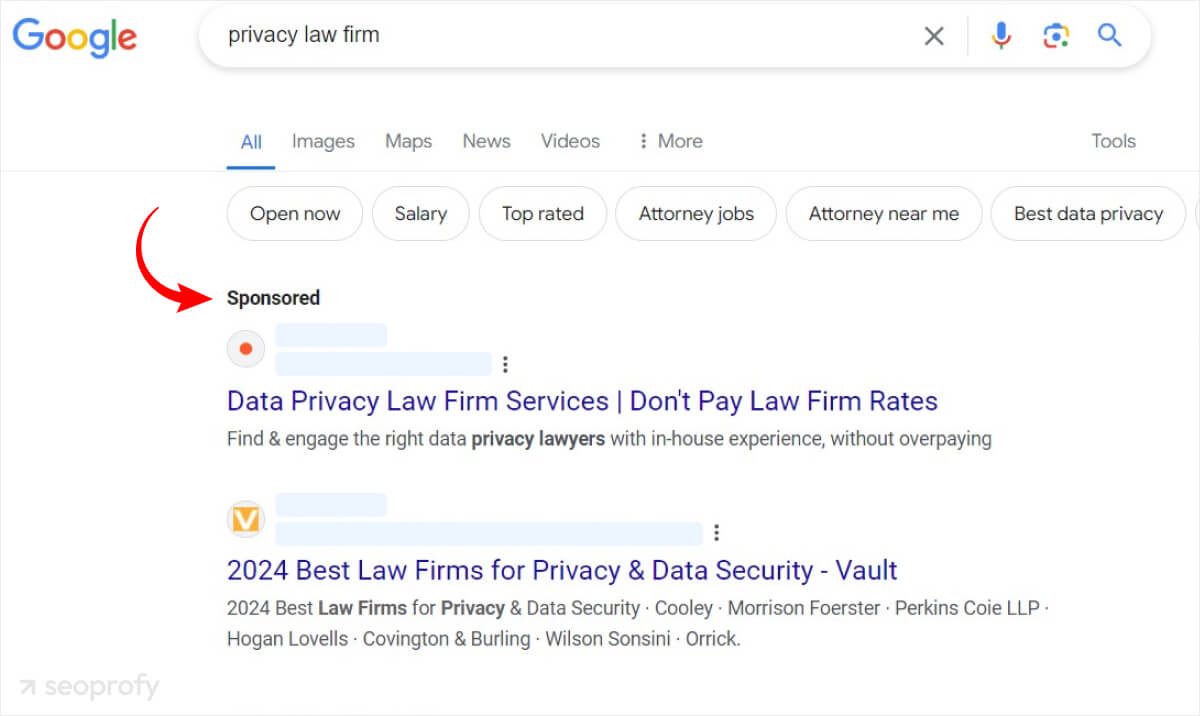
But how does paid advertising compare to SEO? The main advantage of paid ads is speed. While SEO can take months to gain traction, with PPC, you pay for leads and get them almost instantly. So, it’s perfect for capturing high-quality legal leads looking to hire an attorney right now.
However, SEO has powerful benefits that paid ads can’t match. It’s essentially free traffic once you’ve achieved top rankings. So, paid ads should be just one part of a complete digital marketing plan for your law firm.
Integrate Social Media Marketing
Social media is a good way to become an expert voice in the legal field and get new clients from people following and commenting. What kind of content could you share on social media? Here are some ideas:
- Educational content. You could create a video series like “Legal Myths Busted” or “Know Your Rights,” covering various practice areas.
- Industry updates. Legislative changes can often overwhelm people. You could analyze and share your opinions on these topics, providing basic actionable steps.
- Behind-the-scenes content. You could also give your audience a glimpse into the day-to-day operations of your law firm. For instance, share lifestyle content like “A Day in the Life of a Lawyer” to connect with potential leads on a more personal level.
When it comes to platforms, each one has its strengths and potential audience. For example, LinkedIn is great for connecting with colleagues and corporate clients, while Facebook and Instagram are better for reaching and directly engaging with individual legal leads interested in resolving personal legal issues.
In addition, legal professionals often overlook video content platforms, but they can be a valuable resource for lead generation. The world of law can be too complicated for people to understand alone, and legal services are expensive for many. So, many people turn to YouTube channels and TikTok creators for legal advice that is accessible and easy to understand.
YouTube is a worthwhile place to offer free initial legal advice and engage clients for full service. Here are some lawyer YouTube channels to get inspiration from:
- LegalEagle. With over three million subscribers, LegalEagle covers major global events from a legal point of view.
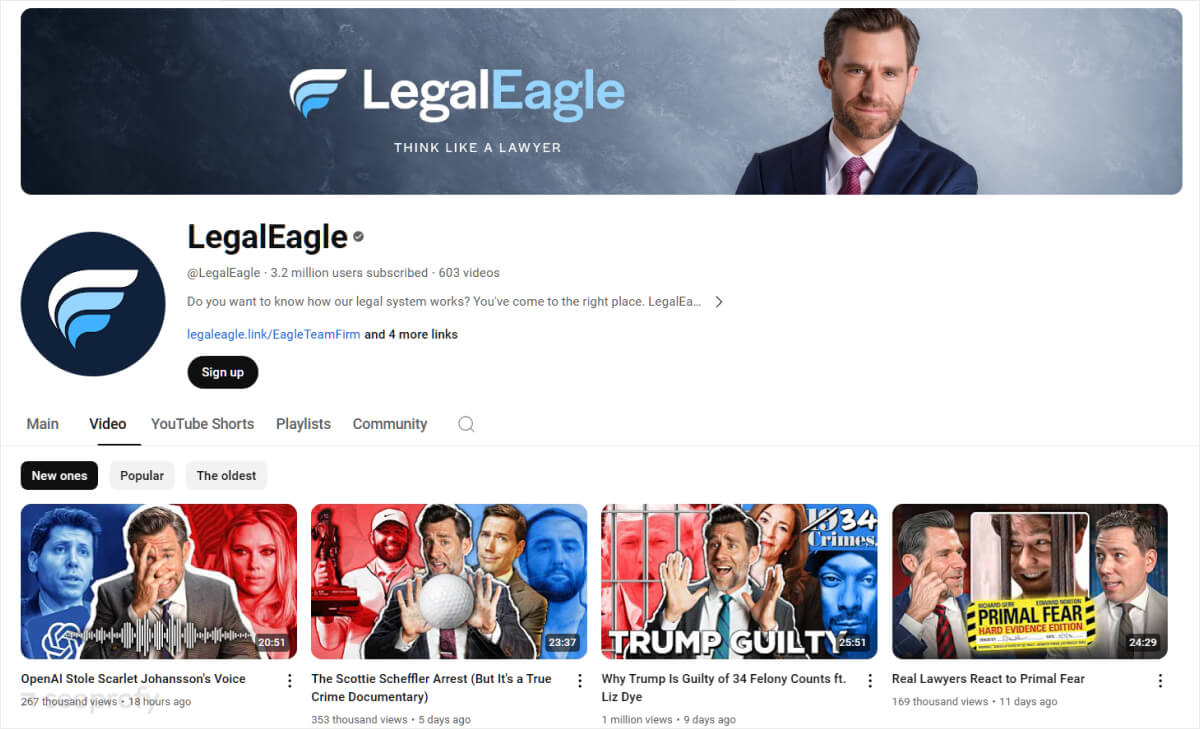
- BloombergLaw. This is another channel that offers legal analysis regarding current events.
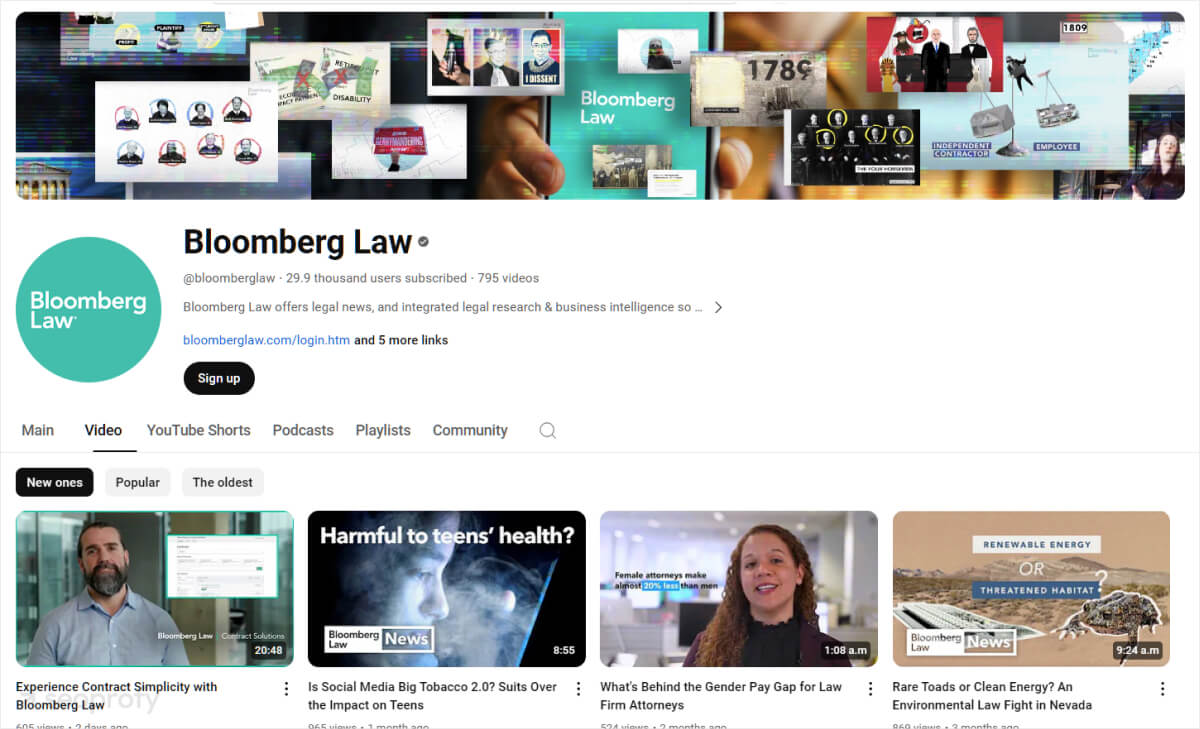
- The Lawyer You Know. This is the channel of a personal injury law firm in Florida. The philosophy of this channel is that everyone should know their rights.
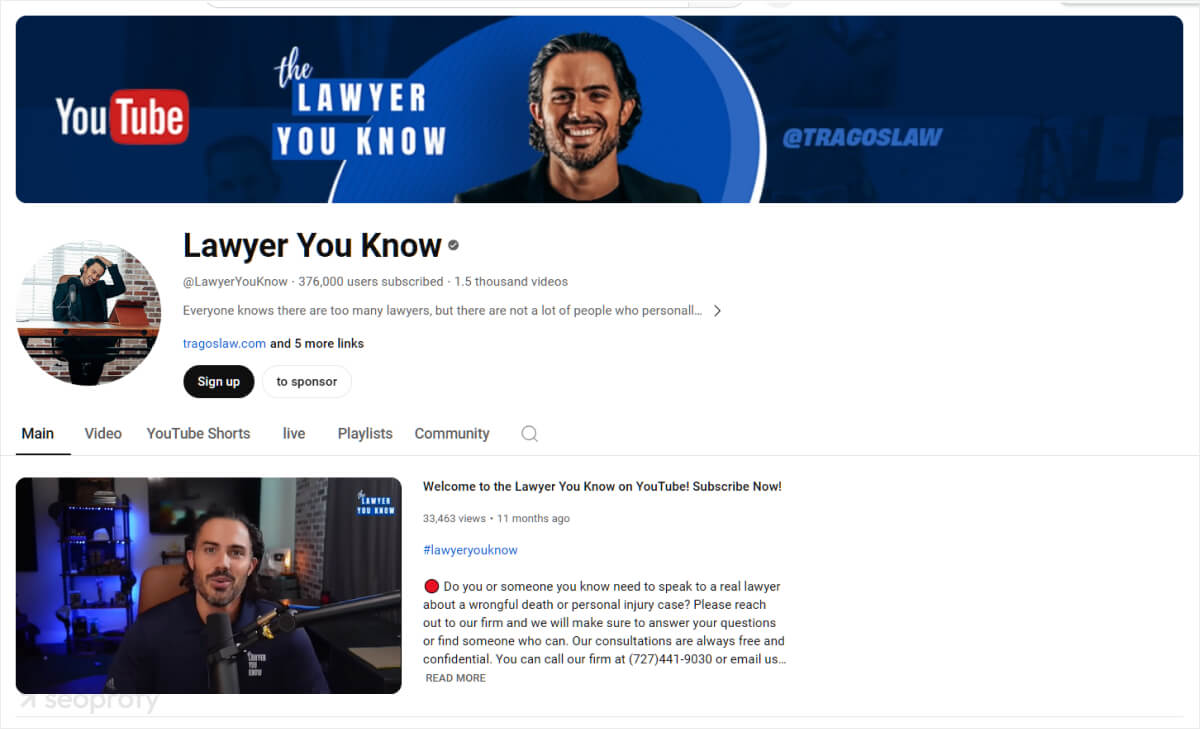
The attorneys in these videos are very charismatic, while the videos themselves have excellent editing and cover a wide range of topics average viewers will find fascinating. Law firms can create such content to build awareness of their brands and subtly encourage viewers to hire them.
Use Online Directories and Listings
This is another source of qualified legal leads, particularly those with a buying intent. Potential leads use directories and listings to browse, compare, and ultimately choose the legal professional that best suits their needs. Here’s a list of some of the most popular online lawyer directories you could be listed on:
If you require more specific, local directories, Google is a tried-and-true method to uncover them. Simply type in queries like “lawyers in [your city]” or “best law firms in [your region],” and see what directory listings pop up.
Pay attention to the ones that seem to be ranking well and have a decent number of users. And while not legal-specific, general online business directories can still be valuable for brand promotion and lead generation for lawyers.
Start Email Marketing Campaigns
Email marketing is an integral part of the attorney lead generation process. It’s one of the most widely used methods to connect with potential clients in any field.
Often, email marketing goes hand in hand with content marketing. The process is straightforward — you offer useful content in exchange for an email address. That’s how you expand your law firm’s client base.
Once you convince people to subscribe to your email newsletters, you’ll be able to update them on news about your firm, success stories, free webinars, new legal services, and more. For best results, segment your email lists based on interests and demographics. For example, you could have separate lists for prospects interested in divorces, criminal defense, business law, etc.
Some people rarely read emails thoroughly but rather scan them. Account for this by using plenty of line breaks, shorter paragraphs, subheadings, bullet points, and images to break up walls of text. With tools like Mailchimp or HubSpot, you can create professional-looking email campaigns.
Build Connections and Gain Referrals
Industry conferences are another way to meet with prospective clients. In the digital space, LinkedIn is a powerful networking tool, too, particularly in the B2B domain. You can join industry groups, gain and share insights there, and comment on other people’s posts.
You can also use LinkedIn for outbound law firm lead generation, reaching out to promising leads, and account-based marketing, nurturing high-value, exclusive leads through personalized content.
And don’t overlook your existing clients as a source of referrals. In an industry that relies so heavily on trust, some of the best leads can come from personal recommendations. Legal issues are very personal, so people often prefer lawyers they can connect with on a human level.
Clients who have had a positive experience working with you will usually be glad to provide word-of-mouth referrals or leave positive reviews on Google Maps and other review aggregators you’re listed on. Lawyer referral programs can further ensure the success of your lead generation strategy.
Hold Webinars and Workshops
Picture this: You’re one of the speakers at a business association’s meeting. The room is filled with decision-makers from businesses of all sizes. By sharing your knowledge on legal topics relevant to them — like contracts, employment law, or regulatory compliance — you immediately position yourself as the go-to expert.
Public speaking doesn’t have to be limited to live events. You could launch a PPC campaign, advertising your upcoming webinar on a relevant topic. Not only will people be able to assess your expertise firsthand, but you can also use webinars as an opportunity to grow your email list for future email marketing: that’s a win-win!
Offer Free Consultations
Free consultations are another opportunity to showcase your expertise and attract quality leads, specifically in cases that will likely need ongoing legal support. That’s how you can plant seeds of trust and remove the initial barrier to entry. If people walk away feeling heard, understood, and confident in your skills, there’s a much higher chance they’ll come back as paying clients.
For one-off issues or very straightforward legal needs, you could give quick and insightful responses on Instagram stories, TikTok videos, or Q&A forums.
Don’t Overlook Traditional Advertising
So far, we’ve covered the main digital marketing strategies for lead generation for lawyers. However, traditional advertising can still be effective in the legal field.
We can’t ignore the fact that many people still watch TV and read print magazines. In 2022, U.S. viewers watched TV for an average of three hours every day. Similarly, many people still trust the printed word. Moreover, you can improve your prestige by doing an interview with a respectable business magazine or just placing a print advertisement in it.

A serious downside is that it’s often much harder to track leads and measure the effectiveness of these methods. Unlike with digital marketing, you can’t easily create dashboards that collect data from all these traditional marketing channels and translate it into clear metrics. You may need to use unique promo codes to assess response rates.
Consider Third-Party Attorney Lead Generation Services
Implementing all the tactics listed in this article yourself can quickly become overwhelming. Think about all the components involved in full-fledged lead generation for law firms: website development, content writing, pay-per-click advertising, email marketing, search engine optimization — the list goes on.
You don’t have to take on every single marketing activity yourself — your time is likely better spent on billable client work. There are plenty of specialized legal lead generation companies that can handle different marketing activities for you. These third parties provide turnkey services and regular reporting based on your priorities and goals.
The benefits go beyond just solid expertise. Many of these attorney lead generation experts also work with dedicated account managers and provide software and other valuable resources as part of their service packages.
In fact, SEO is the most outsourced activity in lead generation for lawyers, as doing it effectively requires special knowledge. There are many search engine algorithms and technical details to understand and stay on top of.
You can simply provide the SEO company with your law firm’s areas of practice, marketing ideas, and organic growth goals. Reliable experts, like SeoProfy, will develop a data-driven SEO strategy tailored to your firm’s needs and budget. This is especially valuable for pursuing the best lead generation for immigration law firms or other highly specialized businesses, as it requires in-depth knowledge of the unique nuances and regulations in this practice area.
Effortless Lead Generation for Lawyers: Start with SEO
Your potential clients have a wealth of information right at their fingertips. They have many options to research and compare before deciding who to hire. This sets a higher bar for law firms to stand out.
If you’re not sure where to begin, start with SEO. It allows you to put lawyer lead generation on autopilot. You won’t have to make cold sales pitches — high-value clients will come straight to you, so you won’t have to wonder how to attract clients to a law firm anymore.
SeoProfy, an experienced law firm SEO agency, is always here to provide a free consultation. Let’s generate leads that will convert to profits!








